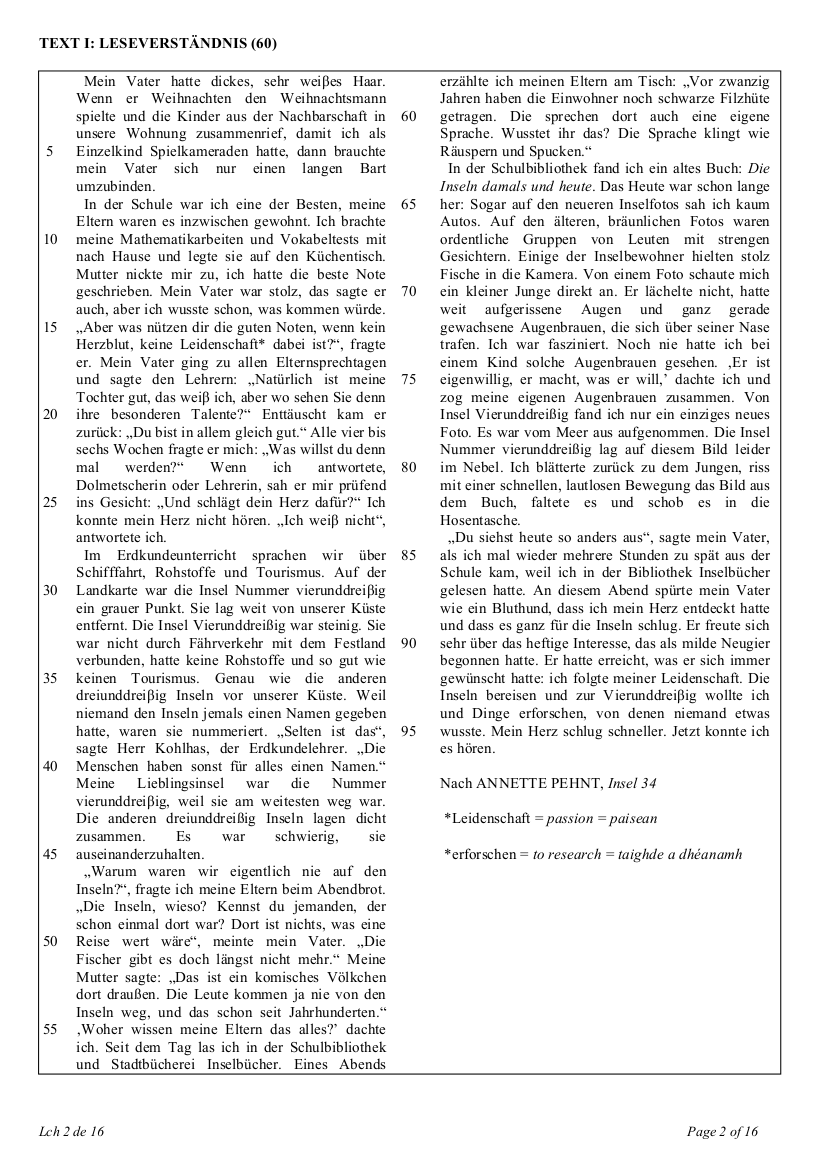

Answer Tips
(6 marks: 3 x 2 marks) Any 3 of the following:
1) dickes Haar
2) weißes Haar
3) spielte den Weihnachtsmann
4) rief andere Kinder ins Haus
5) wohnte in einer Wohnung
6) hatte ein Kind / eine Tochter
7) band sich einen Bart um

Answer Tips
(2 marks)
1) ob seine Tochter (besondere) Talente hatte.

Answer Tips
(4 marks: 2 x 2 marks) Any 2 of the following:
1) Einzelkind.
2) eine der Besten in der Schule. // schrieb oft die beste Note //in allen Fächern (gleich) gut.
3) wollte Dolmetscherin / Lehrerin werden
4) brachte Tests nach Hause
5) zeigte wenig / kein(e) Herz/ Leidenschaft // wusste nicht genau, was sie werden wollte

Answer Tips
(4 marks: 2 x 2 marks) Any 2 of the following:
1) In die (Schul)bibliothek// (Stadt)bücherei (zu gehen)
2) Inselbücher // über Inseln / die Insel zu lesen…..
3) Sich mit ihren Eltern über die Inseln zu unterhalten.

Answer Tips
(5 marks: 5 x 1 marks) Any 5 of the following:
1) There are 34 of them.
2) 33 are grouped together // difficult to distinguish from each other
3) 34 / it was a grey dot on the map.
4) One of them / Number 34 is the furthest /far away from the mainland
5) Number 34 / it is a rocky island.
6) No ferry
7) No raw materials / natural resources
8) Hardly any / little (evidence of) tourism // few tourists.
9) No names / / just numbers

Answer Tips
(9 marks: 3 x 3 marks) Any 3 of the following:
1) There is nothing on the islands // it’s not worth visiting
2) The fishermen / fishers are gone // Fishing no longer important
3) The islanders appear to be a strange / weird / funny lot / strange people
4) The islanders never leave the islands / haven’t done so for centuries.

Answer Tips
(12 marks: 4 x 3 marks) Any 4 of the following:
1) People wore black/ felt hats.
2) Islanders speak their own language.
3) Their language sounds like clearing one’s throat //spitting.
4) Hardly any / few cars.
5) People with stern/ strict faces
6) fishing / Showed fish

Answer Tips
(6 marks: 3 x 2 marks) Any 3 of the following:
1) fascinated
2) never seen such eyebrows
3) pulled her own eyebrows together//Imitated the eyebrows
4) She thought he is stubborn / ‘he has a mind of his own’/ ‘he does what he wants’
5) tore the picture / page out of the book
6) folded the picture / page
7) put the picture / page in her (trouser) pocket

Answer Tips
(12 marks: 3 x 4 marks) Any 3 of the following:
1. The father asked what good are good grades without passion.
2. The father went to parent-teacher meetings to find out her special talents.
3. He was (proud of her but) disappointed that she was equally good at everything //that she had no special talents.
4. He asked her every 4-6 weeks/ frequently what she wanted to be.
5. The examining / questioning expression/ look on his face.
6. When she told her father what she wanted to be he wanted to know, Is your heart telling you this?
7. The father noticed a difference in his daughter/ notices daughter looks different // could sense her passion for the island(s) after she had spent hours reading about the islands
8. He was delighted that her curiosity had turned into a passionate interest.
9. He has achieved what he always wanted: She was following her own passion (Line 91) (must say what he wanted)
10. The author uses contrasting language very well to express the development of passion in the daughter when talking to her father at the beginning and end of the story: Ich konnte mein Herz nicht hören – couldn’t hear my heart – contrasts well with Mein Herz schlug schneller. Jetzt konnte ich es hören – my heart beat faster, now I could hear it.
11. The father is compared to a bloodhound in the way he notices her passion for the island(s)
12. Repetition of the word “Herz”, heart // “Leidenschaft”, passion.
13. The daughter begins to imitate the father’s vocabulary use: following her passion – ich folgte meiner Leidenschaft // Mein Herz schlug schneller.



